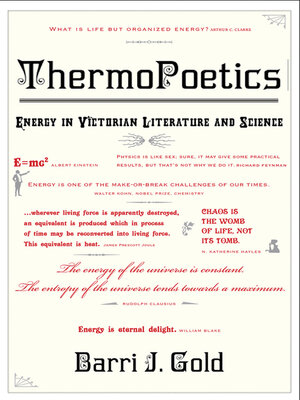
Sign up to save your library
With an OverDrive account, you can save your favorite libraries for at-a-glance information about availability. Find out more about OverDrive accounts.
Find this title in Libby, the library reading app by OverDrive.



Search for a digital library with this title
Title found at these libraries:
| Library Name | Distance |
|---|---|
| Loading... |
In ThermoPoetics, Barri Gold sets out to show us how analogous, intertwined, and mutually productive poetry and physics may be. Charting the simultaneous emergence of the laws of thermodynamics in literature and in physics that began in the 1830s, Gold finds that not only can science influence literature, but literature can influence science, especially in the early stages of intellectual development. Nineteenth-century physics was often conducted in words. And, Gold claims, a poet could be a genius in thermodynamics and a novelist could be a damn good engineer. Gold's lively readings of works by Alfred Tennyson, Charles Dickens, Herbert Spencer, Bram Stoker, Oscar Wilde, and others offer a decidedly literary introduction to such elements of thermodynamic thought as conservation and dissipation, the linguistic tension between force and energy, the quest for a grand unified theory, strategies for coping within an inexorably entropic universe, and the demonic potential of the thermodynamically savvy individual. Gold shows us that in A Tale of Two Cities, for example, Dickens produces order in spite of the universal drive to entropy; Wilde's Dorian Gray and Stoker's Dracula, on the other hand, reveal the creative potential of chaos.Victorian literature embraced the language and ideas of energy physics to address the era's concerns about religion, evolution, race, class, empire, gender, and sexuality. Gold argues that these concerns, in turn, shaped the hopes and fears expressed about the new physics.







